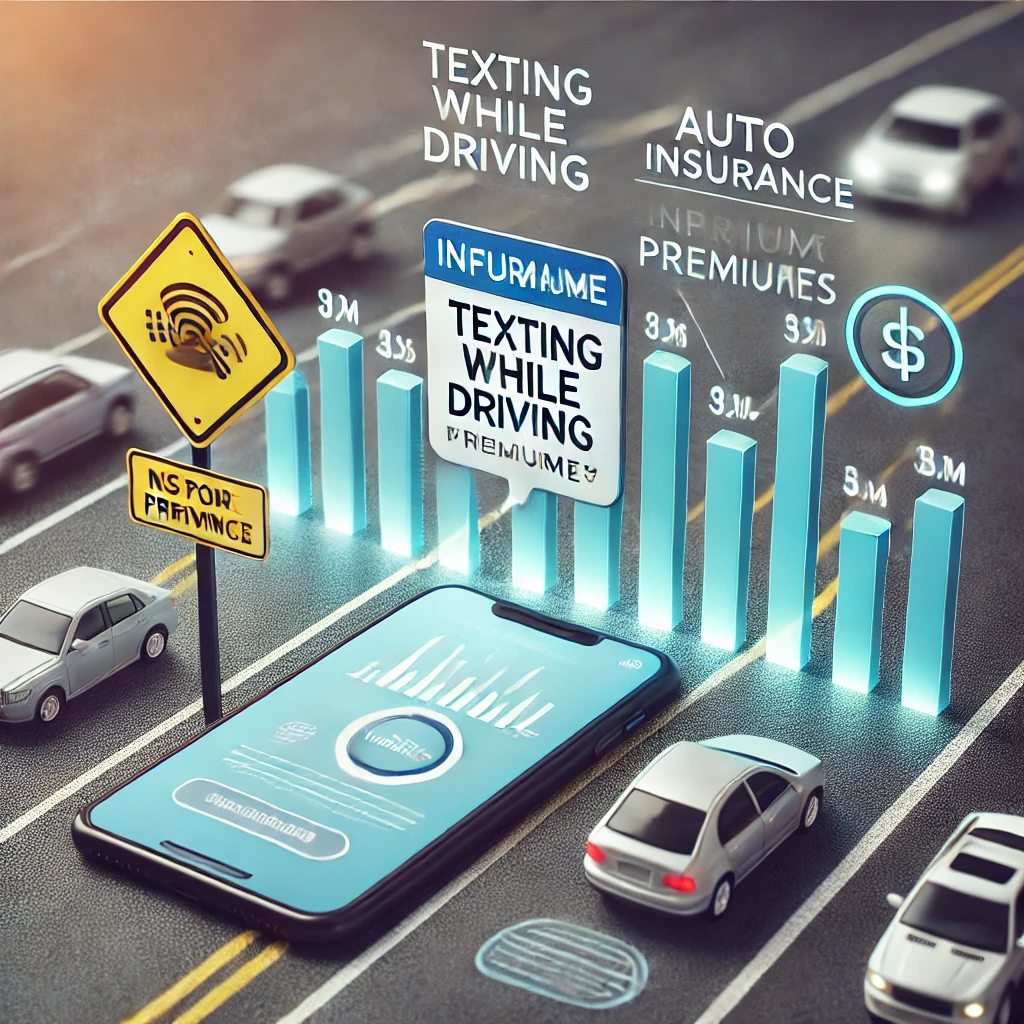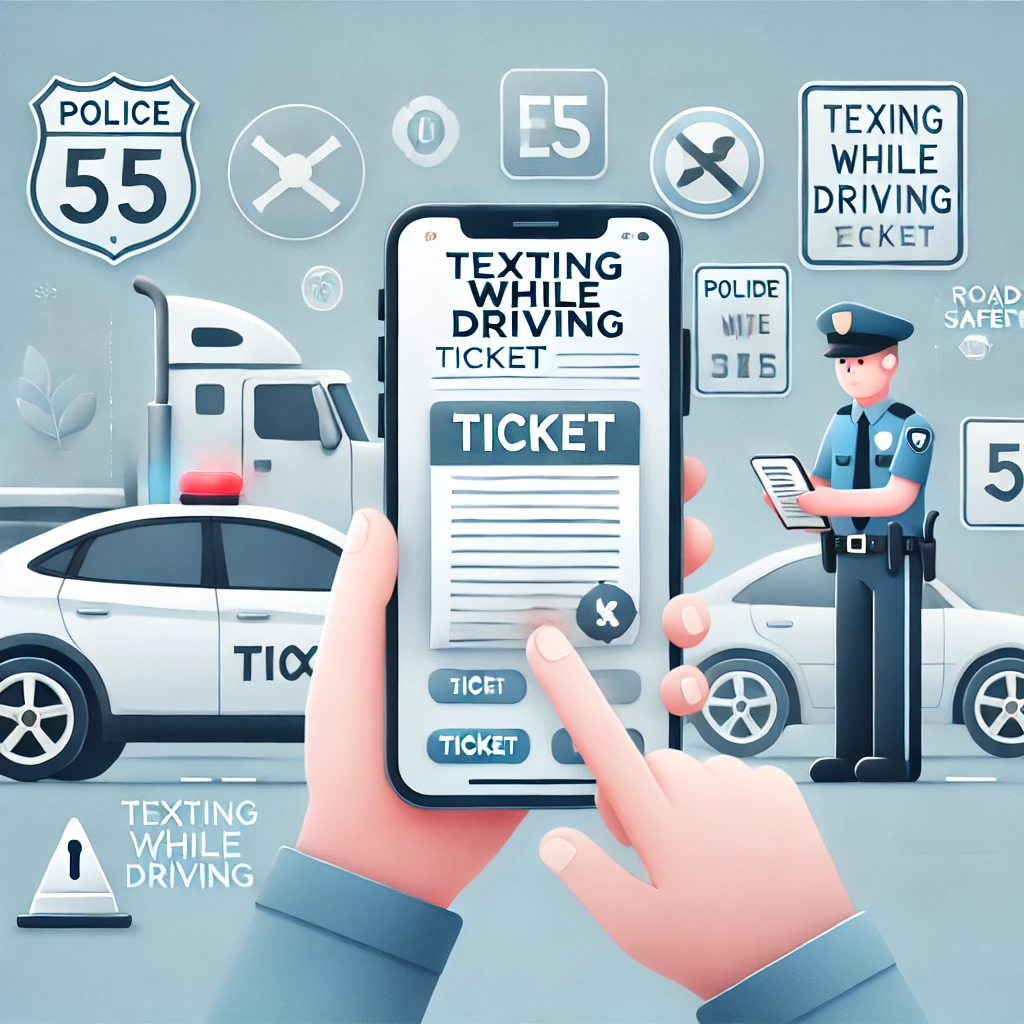Texting while driving can have serious consequences for drivers. One major consequence is a texting while driving ticket increase auto insurance premiums. This article explores how such tickets affect insurance rates, what factors contribute to the increases, and how drivers can reduce their premiums after a violation.
Texting While Driving Tickets
Distracted driving, especially texting while driving, has a direct impact on insurance rates. Getting a texting ticket is considered a traffic ticket, which can increase premiums significantly. Many states have laws against texting, making it essential for drivers to avoid using a cell phone while driving.
Texting and Driving Tickets
Receiving texting and driving tickets leads to increased premiums. Insurers view this as a texting while driving violation, which signals risky behavior. The ticket will affect rates, with the increase depending on your state and insurance provider.
What Is a Texting While Driving Ticket?
A ticket for texting while driving is issued when a driver is caught texting or using a cell phone while behind the wheel. Many states classify this as a moving violation, which adds to a driver’s driving record.

Why Is Texting While Driving Illegal?
Texting while driving is a form of distracted driving. According to the National Highway Traffic Safety Administration (NHTSA), distracted driving causes thousands of accidents yearly. Texting while driving is illegal in most states to promote safe driving and reduce risks on the road.
Impact of a Texting Ticket on Insurance Rates
When you get a ticket for distracted driving, your insurance rate could increase depending on state laws and the insurer’s policies. The ticket increase auto insurance premiums by rates by an average of 27%. Such violations can also increase your insurance costs long-term because they remain on your record, showing a higher likelihood of claims. Actions like texting while driving directly contribute to a driving ticket increase auto insurance costs.
How Does a Ticket Affect Insurance?
Getting a ticket for texting and driving can directly affect your car insurance rate. Most insurance companies view this as a distracted driving violation, which signals risky behavior. This often leads to a car insurance rate increase.
Average Increase in Premiums
A texting while driving ticket increase auto insurance premiums by an average of 27%. However, the actual insurance rate increases vary depending on the state laws for cell phone use, your insurance carrier, and your overall driving record.
The texting while driving ticket increase not only raises premiums but also impacts a driver’s standing with their insurer. A driving ticket increase auto insurance because it signals unsafe habits, leading to higher rates that reflect this risk. Your car insurance rate goes up after a texting violation because insurers associate such behavior with a higher chance of driving accidents. By avoiding behaviors like texting, drivers can prevent a cell phone ticket and maintain lower premiums.
State Laws and Insurance Companies
Some states have stricter penalties for cell phone use while driving. In these states, getting a cell phone ticket may result in higher insurance costs. State laws and your insurance company policies both play a role in determining how much your insurance rates may increase.
Factors That Influence Premium Increases
- Driving Record: A clean driving record might mitigate the impact of a ticket for texting while driving.
- Insurance Carrier: Each insurer handles traffic violations differently.
- State Regulations: States like California and New York impose higher penalties for cell phone tickets.
- Severity of the Violation: If the texting violation leads to an accident, the ticket can increase your premiums even more.
Why Does a Ticket Raise Car Insurance Rates?
A texting ticket is considered a serious distracted driving violation by most insurance companies. Receiving texting and driving tickets often results in higher insurance rates. The ticket will likely increase your auto insurance rate because it signals risky behavior, such as cell phone use while driving, which can lead to driving accidents. Insurers rely on information services to field rates, assessing violations like a cell phone ticket to adjust premiums accordingly.
Insurance Premiums After Texting Violations
A ticket for distracted driving often results in insurance premiums after a texting violation increasing substantially. This ticket is considered a moving violation, making it a costly mistake. The penalty depends on the state, with rates rising by an average of 27% for such violations.
Moving Violations and Risk
A texting while driving ticket is classified as a moving violation. Insurance companies see moving violations as indicators of risky behavior, which increases the likelihood of accidents.
Impact on the Insurance Industry
The insurance industry relies on data to calculate risks. Drivers with a texting ticket are statistically more likely to file claims, which raises overall costs. As a result, your auto insurance rate goes up after a texting violation.
Increased Insurance Costs
A ticket for distracted driving leads to higher insurance because it shows poor driving behavior. Insurers often charge more for drivers who engage in activities like texting or using a cell phone while driving.
How to Mitigate the Impact of a Texting Ticket
An insurance expert might advise drivers that a texting while driving ticket increase impacts how much insurance goes up. The ticket depends on factors like the state’s penalty system and past driving history. To increase your car insurance premiums after a violation, insurers focus on how texting while driving affects risk profiles. Practicing safe habits and avoiding distractions while driving is essential to keep rates under control.
Shop for Better Rates
After a ticket for texting, consider becoming an insurance shopper. Compare quotes from different insurance companies to find lower rates.
Take a Safe Driving Course
Some states allow drivers to take a safe driving course to reduce the impact of a distracted driving violation on their record. This can help decrease the increase in car insurance premiums.
Avoid Repeat Offenses
To prevent further insurance rate increases, avoid using your cell phone while driving. Safe driving practices can help rebuild trust with your insurance company and state.
Insurance Rates and Distracted Driving
Distracted driving, especially texting while driving, has a direct impact on insurance rates. Getting a texting ticket is considered a traffic ticket, which can increase premiums significantly. Many states have laws against texting, making it essential for drivers to avoid using a cell phone while driving.
State Laws and Insurance Impact
State laws for cell phone use can help avoid violations. Whether you’re texting or using a device, the increase in car insurance premiums after a violation is significant. To make informed decisions, drivers must recognize how texting while driving affects their financial standing.
State laws for cell phone use
Different state laws for cell phone use regulate texting while driving. Some states impose fines, while others suspend licenses for repeat offenders. Understanding these laws and your insurance company policies can help you avoid violations.
Ticket Add and Rate Increase
A ticket add impacts your car insurance rate. Such violations often lead to insurers offering limited coverage options, such as a 500 deductible policy to mitigate risks.
Penalties and Insurance Rates
A cell phone ticket is considered a serious offense in many states. The ticket will likely increase your premiums, especially if it’s your second or third offense.
Final thoughts of Texting While Driving Ticket Increase:
A texting while driving ticket increase auto insurance premiums significantly. The best way to avoid these costs is by practicing safe driving and following all state laws for cell phone use. If you do get a ticket, take steps to mitigate the impact on your insurance.
FAQ’s Of Texting While Driving Ticket Increase:
How Much Does a Texting While Driving Ticket Increase?
A texting while driving ticket increase auto insurance premiums by an average of 27%. However, this varies by state and insurance companies.
Does a Ticket Always Affect Insurance?
Yes, a Texting While Driving Ticket Increase usually impacts your insurance. However, the extent depends on your insurance carrier and driving record.
Can I Avoid a Premium Increase?
Taking proactive steps like attending a safe driving course or shopping for new policies can help lower the increase in auto insurance.
How Do Insurance Companies Know About a Ticket?
Your insurance carrier checks your driving record during policy renewals. Any driving violations, including a ticket for texting while driving, will appear.
Are There Alternatives to Paying Higher Premiums?
Yes, some states offer programs that allow drivers to reduce penalties for distracted driving violations. These programs might include traffic school or community service.

